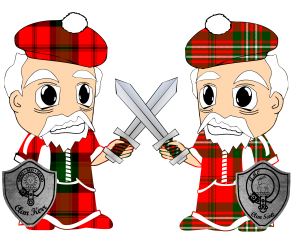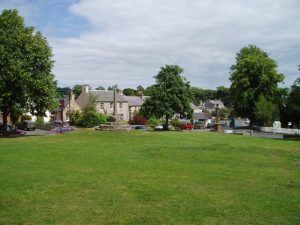Kerr vs. Scott
 In 1526 the young King of Scotland James V was being held captive by his step father, Archibald Douglas The 6th Earl of Angus. Archibald was originally suppose to hand over James to the Earl of Arran but refused. King James, while still in custody, was able to send word to Sir Walter Scott of Buccleuch requesting help. Sir Walter organized an assault on Douglas. The Scotts and a band of around 1000 Border Reivers intercepted James and his captors at Melrose, Scotland as he was being escorted to Edinburgh.
In 1526 the young King of Scotland James V was being held captive by his step father, Archibald Douglas The 6th Earl of Angus. Archibald was originally suppose to hand over James to the Earl of Arran but refused. King James, while still in custody, was able to send word to Sir Walter Scott of Buccleuch requesting help. Sir Walter organized an assault on Douglas. The Scotts and a band of around 1000 Border Reivers intercepted James and his captors at Melrose, Scotland as he was being escorted to Edinburgh.
Scott led his men down Eildon Hill to attack the group guarding James. The opposing forces led by Archibald Douglas consisted of mostly members of Clan Kerr. The Kerrs were outnumbered but able to hold their ground until Lord Hume arrived with reinforcements of 80 more Kerrs. These fresh troops flanked the Scott troops and were able to drive them back. During the retreat of the Scott forces, Andrew Kerr of Cessford was killed by one of Scott’s men, infuriating the Kerrs. The Scott Clan lost about 80 men in the battle and the Kerrs lost nearly 100. Sir Walter Scott was captured during the battle and imprisoned in Blackness Castle. On September 5, 1528 he was pardoned and freed by an act of Parliament.

There was a brief peace agreement between the two clans in 1529 when the two chiefs met at Ancrum, a village in the boarder region of Scotland. It was decided that Sir Walter Scott would go on a pilgrimage and say mass for the soul of Andrew of Cessford. The Chief of Clan Kerr would also go on a similar pilgrimage and pray for the souls of the Scotts lost in the battle. It was also stipulated that Sir Walter’s heir would marry the sister of the Clan Kerr chief. All further disagreements between the clans were to be settled by six arbiters. This agreement did not seem to last beyond 1535 as Sir Walter was imprisoned by the government for “levying war against the Kerrs”.
The feud between the two clans climaxed in the year 1552 with the murder of Sir Walter Scott. Scott was walking on High Street in Edinburgh on October 4th, 1552 when he came upon a group of Kerrs accompanied by John Hume of Coldenknowes. Hume took the opportunity to stab Scott with his sword while yelling to the band of Kerrs “Strike! Ain strike for they father’s sake!” in reference to the killing of Andrew Kerr at the battle of Melrose, 25 years earlier. Scott was wounded by Hume but not killed, the band of Kerrs pounced and repeatedly stabbed him until he was dead.
In 1564 a contract between the two clans was forged to stop the feud, the agreement was between Sir Walter Scott of Branxholm and Sir Walter Kerr of Cessford. The Scotts agreed not to pursue the Kerrs criminally or civilly for the murder of Sir Walter Scott. The Kerrs agreed not to go after the Scotts for any previous injustices. Sir Walter Kerr was also required to go to the parish of Kirk in Edinburgh and in front of a crowd ask for mercy from god for the slaughter of Walter Scott.